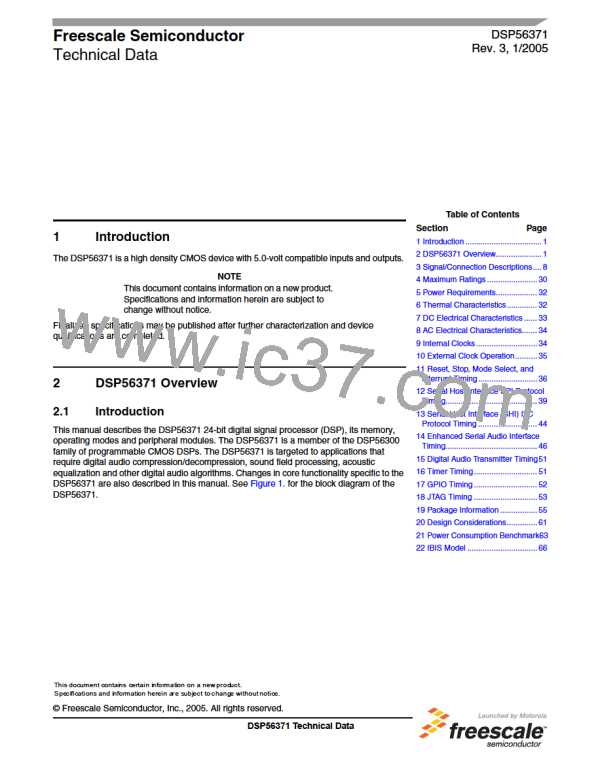Signal/Connection Descriptions
Table 9. Enhanced Serial Audio Interface_1 Signals
State during
Signal Name
Signal Type
Signal Description
Reset
SDO4_1
Output
GPIO
Serial Data Output 4_1—When programmed as a transmitter,
disconnected SDO4_1 is used to transmit data from the TX4 serial transmit
shift register.
SDI1_1
PE7
Input
Serial Data Input 1_1—When programmed as a receiver,
SDI1_1 is used to receive serial data into the RX1 serial receive
shift register.
Input, output, or
disconnected
Port E7—When the ESAI_1 is configured as GPIO, this signal
is individually programmable as input, output, or internally
disconnected.
The default state after reset is GPIO disconnected.
Internal Pull down resistor.
This input is 5 V tolerant.
SDO3_1
Output
Input
GPIO
Serial Data Output 3—When programmed as a transmitter,
disconnected SDO3_1 is used to transmit data from the TX3 serial transmit
shift register.
SDI2_1
PE8
Serial Data Input 2—When programmed as a receiver, SDI2_1
is used to receive serial data into the RX2 serial receive shift
register.
Input, output, or
disconnected
Port E8—When the ESAI_1 is configured as GPIO, this signal
is individually programmable as input, output, or internally
disconnected.
The default state after reset is GPIO disconnected.
Internal Pull down resistor.
This input is 5 V tolerant.
SDO2_1
SDI3_1
PE9
Output
Input
GPIO
Serial Data Output 2—When programmed as a transmitter,
disconnected SDO2_1 is used to transmit data from the TX2 serial transmit
shift register.
Serial Data Input 3—When programmed as a receiver, SDI3_1
is used to receive serial data into the RX3 serial receive shift
register.
Input, output, or
disconnected
Port E9—When the ESAI_1 is configured as GPIO, this signal
is individually programmable as input, output, or internally
disconnected.
The default state after reset is GPIO disconnected.
Internal Pull down resistor.
This input is 5 V tolerant.
Freescale Semiconductor
DSP56371 Technical Data
25

 FREESCALE [ Freescale ]
FREESCALE [ Freescale ]